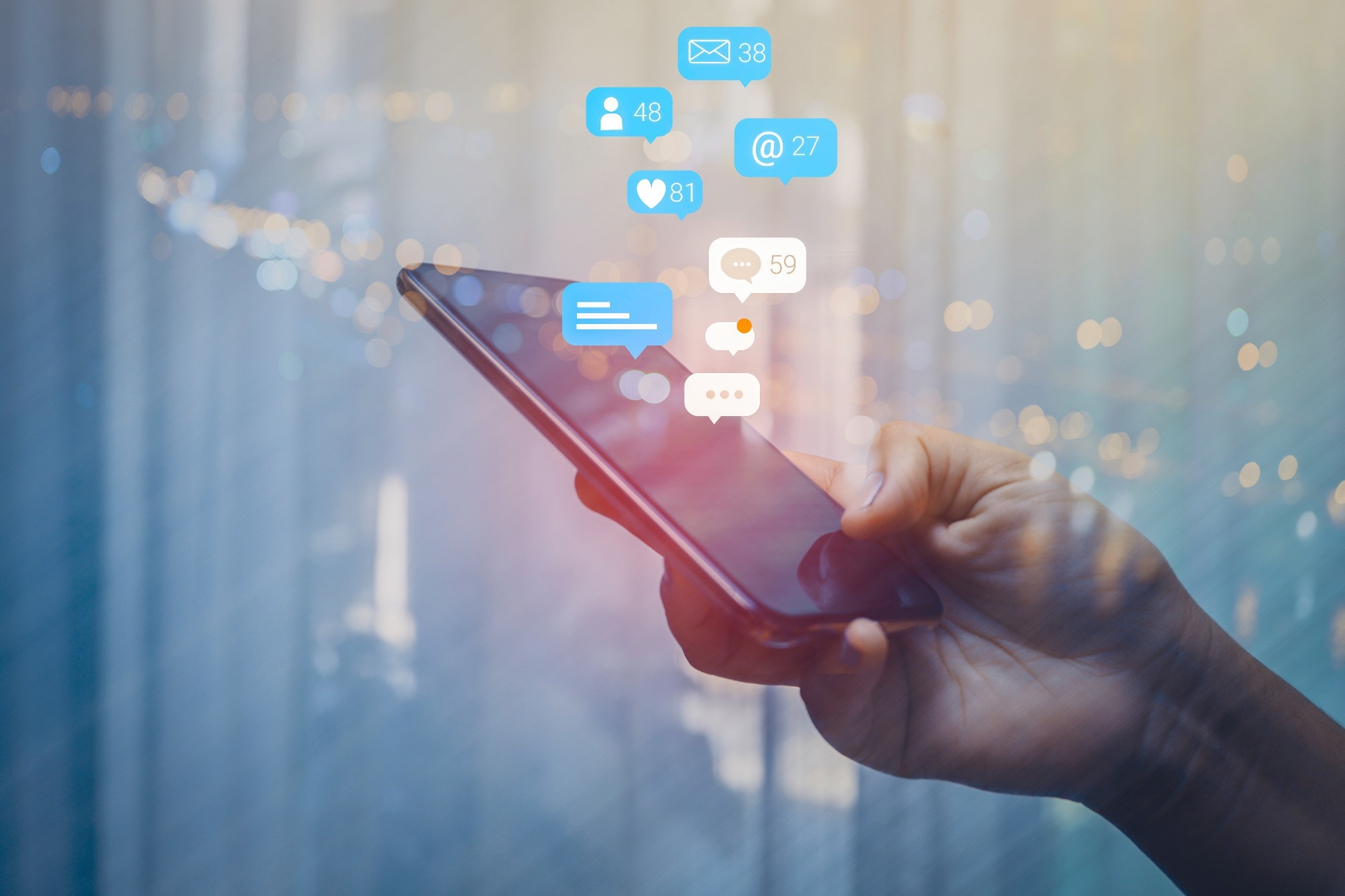How may social media habits impact mental wellbeing?
Strategies for a balanced digital life
References
Further reading
The term “Digital Nutrition” was coined by a Sydney-based psychologist, Jocelyn Brewer, to describe the impact of social media habits on our mental wellbeing and provide guidance on developing healthy digital habits and improving our digital wellbeing.
“Digital Nutrition” is a guilt-free philosophy to guide the intentional and intelligent use of digital platforms and the conscious consumption of digital content.
 Image Credit: RoBird/Shutterstock.com
Image Credit: RoBird/Shutterstock.com
How may social media habits impact mental wellbeing?
Studies investigating the effect of social media use on mental wellbeing have produced mixed results. While some studies have clearly mentioned potential detrimental health effects of digital platforms, some have highlighted its positive effects.
Mental health consequences of social media use mostly depend on the type of content and the time spent on various social media platforms. An experience of cyberbullying or an exposure to violent, sexual, and hateful content can certainly have serious negative mental health impacts, especially among children, adolescents, and young adults. In contrast, social and emotional connections developed through online platforms can potentially boost the mental health of minority communities who often experience health disparities and chronic health conditions.
A growing-pool of evidence indicates that people who intend to compare themselves with digitally-enhanced images online, or compare their social media popularity with others are more likely to experience negative mental health consequences, such as anxiety and depression. Similarly, social media use has been found to trigger body image concerns and increase the risk of deadly psychiatric illnesses, such as eating disorders.
In contrast, it has been observed that certain positive social media experiences, such as having an online conversation with someone during lonely hours or making healthy social networks, are associated with happiness, meaning and purpose, physical and mental health, character, close social relationships, and financial stability.
Regarding the impact of time spent on social media, evidence indicates that an online exposure of around 1 – 2 hours daily could benefit children and adolescents. However, negative effects are more likely in cases where social media usage overshadows other activities that promote wellbeing, such as physical exercise, sleep, and offline social activities. Thus, for a safer use of social media, it is important to provide children and their family members with clear scientific information about both positive and negative consequences of its usage.
Doomscrolling is a relatively new area of research in mental health, which defines an endless scrolling habit of social media users to look for depressing and negative information obsessively. A sharp rise in doomscrolling habit has been observed among social media users during the most recent coronavirus disease 2019 (COVID-19) pandemic. The unknown nature of the pandemic might have instigated people to get all possible information about the disease via internet and social media, which are mostly negative news.
A constant feeding of the brain with negative news can significantly increase the risk of anxiety, fear, stress, and depression. An endless scrolling can also disrupt the sleep cycle and drain out energy. At the physiological level, an endless scrolling is associated with a constant supply of the brain with stress hormones like cortisol. Persistently high levels of stress hormones can exhaust the brain and body, leading to physical and mental health problems.
What's Digital Nutrition?
Strategies for a balanced digital life
The first step towards improving digital wellbeing is understanding the pattern and frequency of digital practice. A variety of screentime apps are available that can be used to set a time limit to monitor the time spent on various digital platforms. It is important to restrict digital habits to specific and more appropriate time periods.
It is important to feel or observe the sensations generated in the body in response to different digital or social media contents. If a person consciously pays more attention to negative news, it is more likely that the body is sending signals to motivate him/her to put on the brakes. Thus, a person should to be mindful of how a particular content influences him/her feelings while scrolling endlessly.
Compulsive scrolling on digital platforms is another malpractice that can potentially affect digital wellbeing. People often spend time on social media or other digital platforms without even much thoughts. Thought stopping is a useful cognitive-behavioral technique that is typically used to stop obsessive or anxious thoughts. This technique could be helpful for avoiding compulsive scrolling behavior.
If digital habits are disrupting mental wellbeing, it is crucial to disconnect yourself from screentime by mindful movement. Breathing exercise and meditation could be helpful to avoid digital distraction and relax and refresh the mind from negative thoughts. Physical excise also helps increase the brain level of serotonin, which is a mood-enhancing neurotransmitter.
Children and adolescents are more likely to be easily influenced by digital and social media contents. Guidance from parents and teachers about how social media works and how social media activities should be perceived could be an effective strategy to avoid its negative mental health impact on children and adolescents. Parents should also provide a safe and empathic environment to their children when it comes to social media use.
Parents should also engage their children with alternative extracurricular activities to maintain a balance between online and offline life. Another vital strategy is to keep an eye on the content to which children are getting exposed everday. It is important to promote educative, inspirational, or funny contents and minimize negative contents to children.
References
Further reading